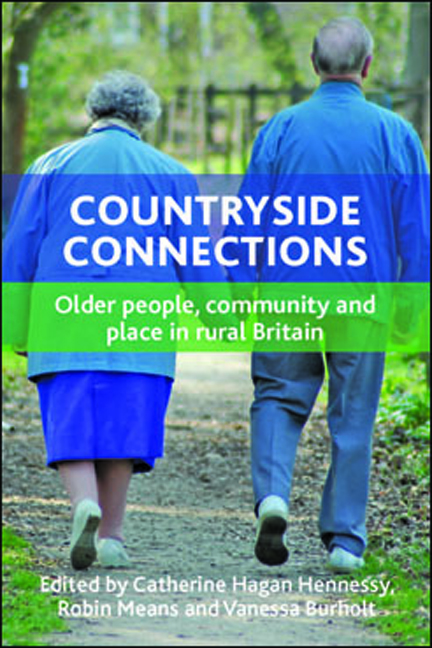Book contents
- Frontmatter
- Contents
- List of tables and figures
- Acknowledgements
- Notes on contributors
- Foreword
- one Countryside connections in later life: setting the scene
- two Conceptualising rural connectivities in later life
- three Rural connectivity and older people’s leisure participation
- four Connecting with community: the nature of belonging among rural elders
- five Beyond transport: understanding the role of mobilities in connecting rural elders in civic society
- six Deep mapping and rural connectivities
- seven Older people, low income and place: making connections in rural Britain
- eight Connecting with older people as project stakeholders: lessons for public participation and engagement in rural research
- nine Towards connectivity in a Grey and Pleasant Land?
- Index
seven - Older people, low income and place: making connections in rural Britain
Published online by Cambridge University Press: 04 March 2022
- Frontmatter
- Contents
- List of tables and figures
- Acknowledgements
- Notes on contributors
- Foreword
- one Countryside connections in later life: setting the scene
- two Conceptualising rural connectivities in later life
- three Rural connectivity and older people’s leisure participation
- four Connecting with community: the nature of belonging among rural elders
- five Beyond transport: understanding the role of mobilities in connecting rural elders in civic society
- six Deep mapping and rural connectivities
- seven Older people, low income and place: making connections in rural Britain
- eight Connecting with older people as project stakeholders: lessons for public participation and engagement in rural research
- nine Towards connectivity in a Grey and Pleasant Land?
- Index
Summary
Introduction
Many of our poorest and most vulnerable older people live in the country and have little choice, but to use heating oil to keep warm. A significant number can't afford the hundreds of pounds that they have to pay up front and simply do without, often, in the coldest months of the year. (Age UK, 2013)
It is usually in the winter months that the connections between poverty and older people are made by the media, campaign groups and politicians in the UK. Recent coverage of these connections in the national press, for example, has focused on findings from a survey of older people commissioned by the charity Age UK, which indicates that about two million people aged over 60 years are so cold that they retire to bed when they are not tired with a similar number moving into a single room within their homes in order to reduce their energy bills. What is also clear from the preceding Age UK quote is that fuel poverty among older people appears to be more pronounced in rural areas, where detached and older properties combine with the absence of mains gas provision to increase the costs of heating homes. In this chapter, we maintain the focus on rural areas by discussing the broader situations, problems and experiences of older people living on low incomes in rural parts of Britain. To do this, we draw on empirical materials from the Grey and Pleasant Land (GaPL) project. In particular, we utilise findings from our study on the welfare and well-being of older people in rural areas, which involved surveys of older people and qualitative research with older people living on low incomes in all six of the GaPL rural case study areas. Before discussing key themes emerging from our research, we explore existing academic accounts of the relations between older people, low income and place in urban and rural areas.
Older people, low income and place: national and urban perspectives
The linkages between low income and old age have long been recognised by poverty researchers (Alcock, 2004; Lister, 2004; Cann and Dean, 2009). Townsend's (1979) national survey of poverty in the 1960s indicated that almost two thirds of retired people were living below the poverty line (defined as an income less than 140% of a household's supplementary benefit entitlement), a rate more than double that recorded for working-age groups.
- Type
- Chapter
- Information
- Countryside ConnectionsOlder People, Community and Place in Rural Britain, pp. 193 - 220Publisher: Bristol University PressPrint publication year: 2014

